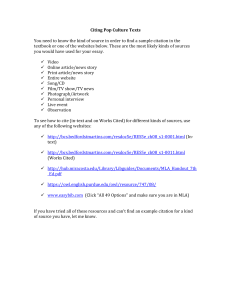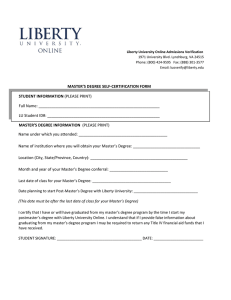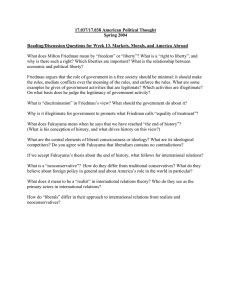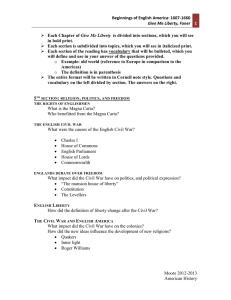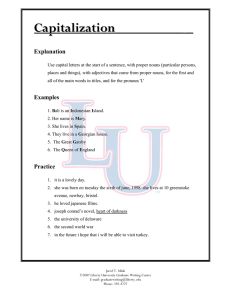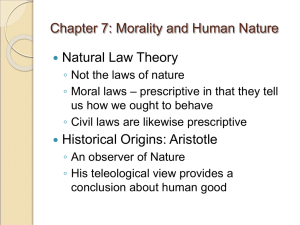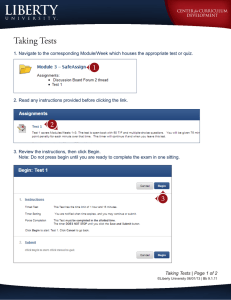Wikipedia is almost universally considered an invalid source
advertisement
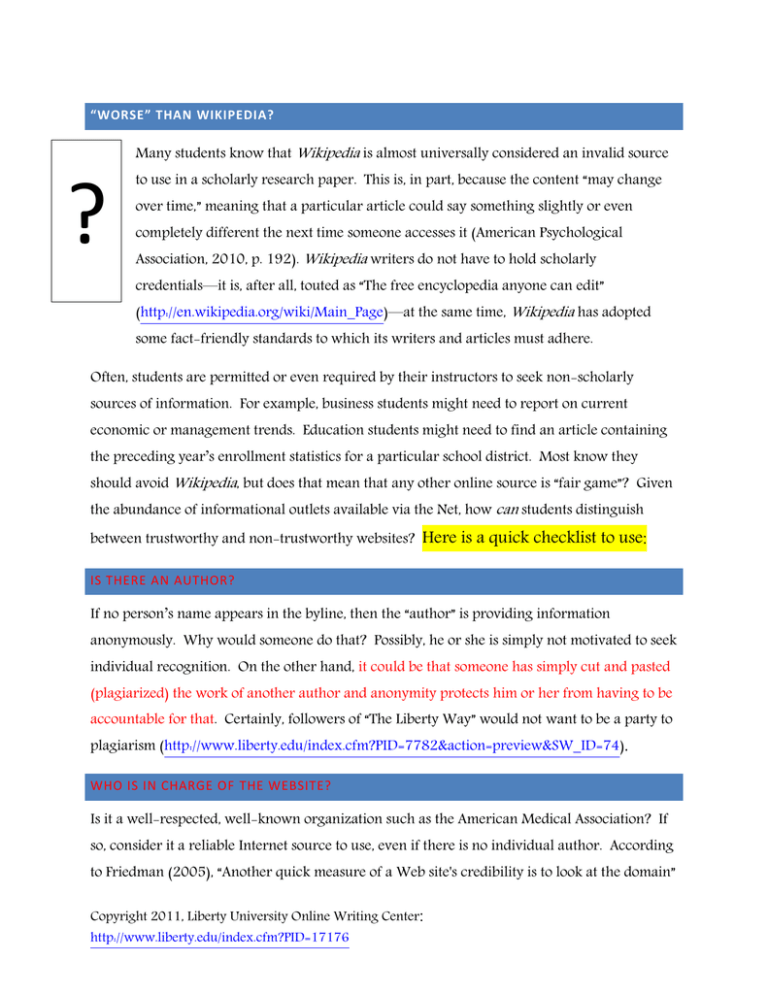
“WORSE” THAN WIKIPEDIA? Many students know that Wikipedia is almost universally considered an invalid source ? to use in a scholarly research paper. This is, in part, because the content “may change over time,” meaning that a particular article could say something slightly or even completely different the next time someone accesses it (American Psychological Association, 2010, p. 192). Wikipedia writers do not have to hold scholarly credentials—it is, after all, touted as “The free encyclopedia anyone can edit” (http://en.wikipedia.org/wiki/Main_Page)—at the same time, Wikipedia has adopted some fact-friendly standards to which its writers and articles must adhere. Often, students are permitted or even required by their instructors to seek non-scholarly sources of information. For example, business students might need to report on current economic or management trends. Education students might need to find an article containing the preceding year’s enrollment statistics for a particular school district. Most know they should avoid Wikipedia, but does that mean that any other online source is “fair game”? Given the abundance of informational outlets available via the Net, how can students distinguish between trustworthy and non-trustworthy websites? Here is a quick checklist to use: IS THERE AN AUTHOR? If no person’s name appears in the byline, then the “author” is providing information anonymously. Why would someone do that? Possibly, he or she is simply not motivated to seek individual recognition. On the other hand, it could be that someone has simply cut and pasted (plagiarized) the work of another author and anonymity protects him or her from having to be accountable for that. Certainly, followers of “The Liberty Way” would not want to be a party to plagiarism (http://www.liberty.edu/index.cfm?PID=7782&action=preview&SW_ID=74). WHO IS IN CHARGE OF THE WEBSITE? Is it a well-respected, well-known organization such as the American Medical Association? If so, consider it a reliable Internet source to use, even if there is no individual author. According to Friedman (2005), “Another quick measure of a Web site's credibility is to look at the domain” Copyright 2011, Liberty University Online Writing Center: http://www.liberty.edu/index.cfm?PID=17176 (p. 158). “Following ‘.gov’ and ‘.mil’ sites, university [‘.edu’] sites are among the most trusted” (Friedman, 2005, p. 158). Friedman indicated that “.org” sites can be useful, but students should keep in mind that information presented can be one-sided as organizations typically have an agenda to promote--this is an area where a student’s personal judgment must prevail. WHAT ABOUT POPULAR “ANSWER” SITES? When students type a question or term into Google or another popular search engine, they are likely to come up with lots of answers, and quickly. Yet, information that is easiest to come by is often the least reliable because it is the least verifiable. Websites such as answers.com and blurtit.com provide answers to anyone from anyone; responses that sound the most plausible are often rated the most highly by users, but this is no guarantee that the “popularity contest winner’s” facts have actually been checked. Unlike Wikipedia, popular answer sites do not solicit references—they simply require an Internet connection and a willingness to share knowledge and expertise anonymously. As noted under “Is There an Author?” such anonymity creates questions that a serious academic researcher would not want to remain unresolved. WHERE ELSE SHOULD STUDENTS LOOK? Fortunately, Liberty students who need to look beyond EBSCOhost and other scholarly databases available through the LU Online Library have more options than simply Google or “I feel lucky.” While performing solid research will always require a student to exercise sound judgment regarding the validity of online sources, Friedman’s (2005) guidelines and the questions above should provide a yardstick against which to measure the reliability of Internet sources. In addition, www.hackerhandbooks.com recommends a number of reliable nonscholarly and semi-scholarly websites that students may use for their research: Social Sciences http://bcs.bedfordstmartins.com/resdoc5e/RES5e_ch06_s1-001.html Business http://bcs.bedfordstmartins.com/resdoc5e/RES5e_ch06_s1-003.html Education http://bcs.bedfordstmartins.com/resdoc5e/RES5e_ch06_s1-006.html Psychology http://bcs.bedfordstmartins.com/resdoc5e/RES5e_ch06_s1-011.html Copyright 2011, Liberty University Online Writing Center: http://www.liberty.edu/index.cfm?PID=17176 References American Psychological Association (6th ed.). (2010). Publication manual of the American Psychological Association. Washington, DC: Author. Friedman, B.G. (2005). Web search savvy: Strategies and shortcuts for online research [Questia version]. Retrieved from http://www.questia.com/PM.qst?a=o&d=104941481 Copyright 2011, Liberty University Online Writing Center: http://www.liberty.edu/index.cfm?PID=17176
